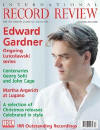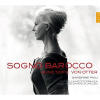Texte paru dans: / Appeared in:
*

International Record Review - (12/2012)
Pour
s'abonner / Subscription information
Naïve
V5286

0822186052860 (ID249)
Consultez toutes les évaluations recensées pour ce cd
~~~~ Reach all the evaluations located for this CD
Anne Sofie von Otter’s ability to reinvent herself with the passing years is something to marvel at. Next year, the Swedish mezzo will enter the fourth decade of a career that goes back to 1983 and she has been a big name in concert and recital halls, as well as opera houses, for the best part of a quarter of a century. Here she is, well into her fifties, assuming the mantle of a Baroque specialist with a brilliant newish ensemble of period instrumentalists founded in 2005 by its director, Leonardo Garcia Alarcón — in a programme of seventhenth-century opera scenes and cantatas by Claudio Monteverdi and his younger contemporaries and disciples Luigi Rossi, Francesco Cavalli and Francesco Provenzale.
Von Otter is, of course, no stranger to Monteverdi, having sung the Messaggiera in Orfeo and Empress Ottavia in L‘incoronazione di Poppea on John Eliot Gardiner’s acclaimed Archiv recordings. She has also sung Nerone in the latter on stage (for Marc Minkowski at the Aix-en-Provence Festival). Here she is joined by Sandrine Piau in two scenes from that opera: the final duet for Poppea and Nero, now thought to be the work of one of Monteverdi ‘s assistants the booklet suggests Benedetto Ferrami or Cavalli, but other names have been put forward by scholars — rather than the great man himself, and their earlier encounter in Act 2, during which the Emperor, having repudiated Ottavia, promises to make Poppea his wife that very day. It is a measure of von Otter’s chameleon-like vocal gifts, these days, that it is hard to tell which of the roles she and Piau are singing, so bright and soprano-like does she sound here. My guess — I’m afraid the booklet is no help at all — is that Piau sings the soprano castrato role of Nero, but having listened three times I am still not sure. What is certain is that the two voices blend ideally and ecstatically in this erotic music, as they do later as the illicit lovers, Diana (von Otter, I think) and Endymion (Piau?) in their rapturous love scene from Cavalli’s La Calisto. Even at this stage of her career, the dual role of Diana and Jupiter disguised as Diana in this wonderfully ribald and sexually ambiguous opera would surely be the perfect challenge for a singer who has specialized in travesty roles (Jupiter as Diana being a double travesty part, like the so-called Mariandl, Octavian in disguise as a girl, in Strauss’s Rosenkavalier).
Another mole that might suit her to perfection is Penelope in Monteverdi’s Il ritorno d’Ulisse in patria — here she is both eloquent and moving in her opening scene, with its plangent, poignant refrain, ‘Torna, torna, deh, torna, torna, Ulisse’ (‘Return, return, ah pray, return. Return Ulysses’). Certainly one might expect von Otter to shine in this music, but it is her savour of the Italian texts that most impresses. In the past, she has had a reputation for coolness, but there is fire in her delivery of these passionate soliloquies: Cavalli’s Lamento from Doriclea — clearly indebted to the parallel number in all that remains of Monteverdi’s Arianna — burns with regal indignation at the slings and of fortune.
She is capable of earthiness, too, in the wheedling, street-singer timbre she summons up for Provenzale‘s Squarciato appena havea (‘Scarcely had shining dawn dispelled the dark mysteries of night’), a ribald parody on Luigi Rossi’s Lamento della Regina di Svezia (‘The Queen of Sweden’s Lament’) which tells of Maria Eleonora’s grief on hearing the news of her husband Gustavus II Adolfus’s death. They were the parents of the exiled Queen Cristina, who converted to Catholicism and held literary, artistic and musical court in Rome from 1654, the year of her abdication, until her death in 1689 — one wonders if she ever heard Provenzale’s mocking piece and, if so, what she might have thought of it). Von Otter reveals in the informative booklet that she has owned this strange and astonishing music — which juxtaposes indecent Neapolitan songs to popular strummed and drummed accompaniments — since it was discovered by her compatriot Arnold Ostman in the late l970s, but this is, I think, her first recording of it. She and her ‘backing group ‘make it sound like seventeenth-century pop music, with a nod to the style of the that Spanish Baroque diva Montserrat Figueras
My only complaint is that the Rossi
Lamento which it parodies, an earlier piece, of course, comes later in the
recital. It is a bit disappointing that a programme such as this is given in
an apparently random sequence, like most popular aria albums these days. She
opens with Monteverdi ‘s ciaccona-like ‘Si dolce è ‘1 tormento’ — one of the
composer’s ‘greatest hits’, I suppose — which is followed by the first of
three instrumental movements from Cavalli’s Elena, exquisitely played
by the Cappella Mediterranea, whose plangent cornetto is one of the most
haunting sounds on this disc. The Poppea excerpts, given in the wrong
order, I might add, are separated by the Provenzale cantata. It seems
symptomatic of this bran-tub programming that the Sinfonia (Overture) to
Elena is programmed after the easlier instrumental ritornellos. It is
surprising that a label of Naïve’s supposedly scholarly credentials should
pay so little attention to chronology and the relation of one piece to
another in a programme such as this. Confronted with such compelling singing
and playing, this might seem a minor niggle to some, but I frankly don’t see
the point of giving an album such as this a highfalutin concept — ‘Baroque
Dream’ — if there is so little thought put into the order of the programme.
Fermer la fenêtre/Close window
Cliquez l'un ou l'autre
bouton pour découvrir bien d'autres critiques de CD
Click either button for many other reviews


